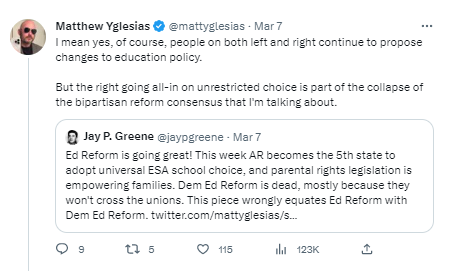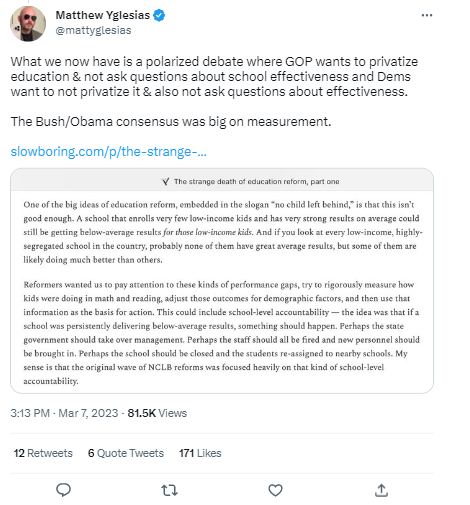 Blogger and journalist Matthew Yglesias wrote an interesting piece on his substack blog called “The Strange Death of Education Reform, Part 1. Here is an excerpt, but do read the whole article.
Blogger and journalist Matthew Yglesias wrote an interesting piece on his substack blog called “The Strange Death of Education Reform, Part 1. Here is an excerpt, but do read the whole article.
Back in 2011, Barack Obama called improving school quality the civil rights issue of our time. There was a tremendous amount of rhetorical heat and conceptual pressure to bring to bear on these questions of school management. And I think a big part of the reason the reform moment eventually collapsed is that even though the reformers’ ideas were basically good, their rhetoric involved massive overpromising.
The death of that era of education reform does not seem so strange to me. The George W. Bush/Barack Obama era reform movement’s faith in technocratic management was politically naïve. The Jurassic school system is not a puppy, and it is more interested in eating your carcass than in fetching a stick. See my post expounding on this idea here.
A power struggle over K-12 policy within the Democratic Party broke out. Sadly, the dinosaurs won, and that generation of reform went extinct.
Jay Greene of the Heritage Foundation remarked on this post on Twitter, leading to a response from Yglesias:


So, a few things to note.
Given that public funding for K-12 education remains safely ensconced in all 50 state constitutions, “privatizing education” is an inaccurate description of the current era. Public schools aren’t going anywhere, and neither are mandatory attendance laws.
Second, the failure of the Bush-Obama era reform coalition in measurement-management inevitably led to a bipartisan disinterest in measurement, at least in comparison to the past. Past policy, however, went overboard on test preparation, with ambiguous tangible benefit.
Different states will have different approaches to academic transparency in choice programs, and the topic will continue to be an ongoing debate, regardless of where the programs start.
To conclude: Ed Reform 1.0 is mostly dead, but it lives on as a learning experience. Reformers have the opportunity to learn from past mistakes and focus more on emancipation than management.